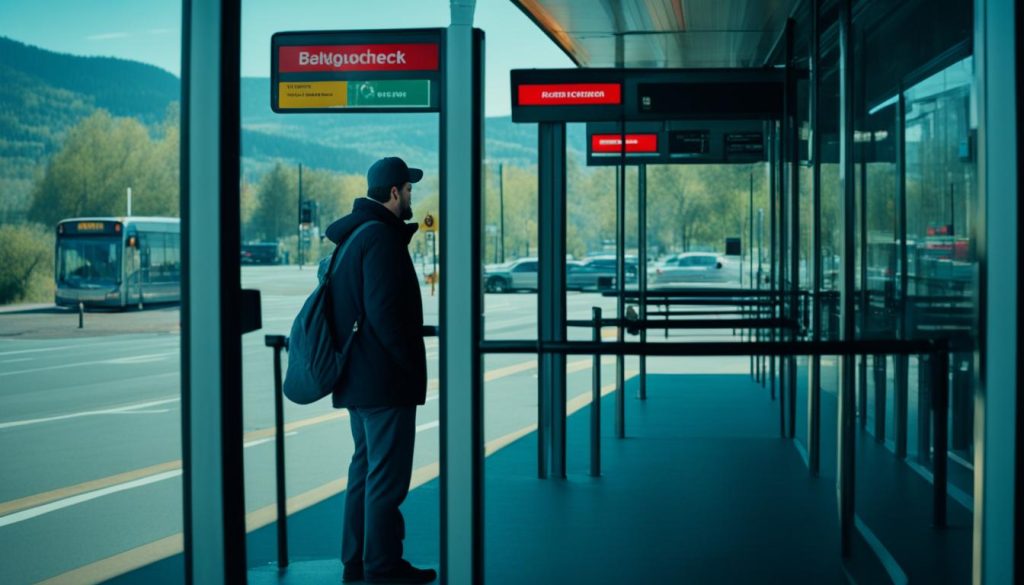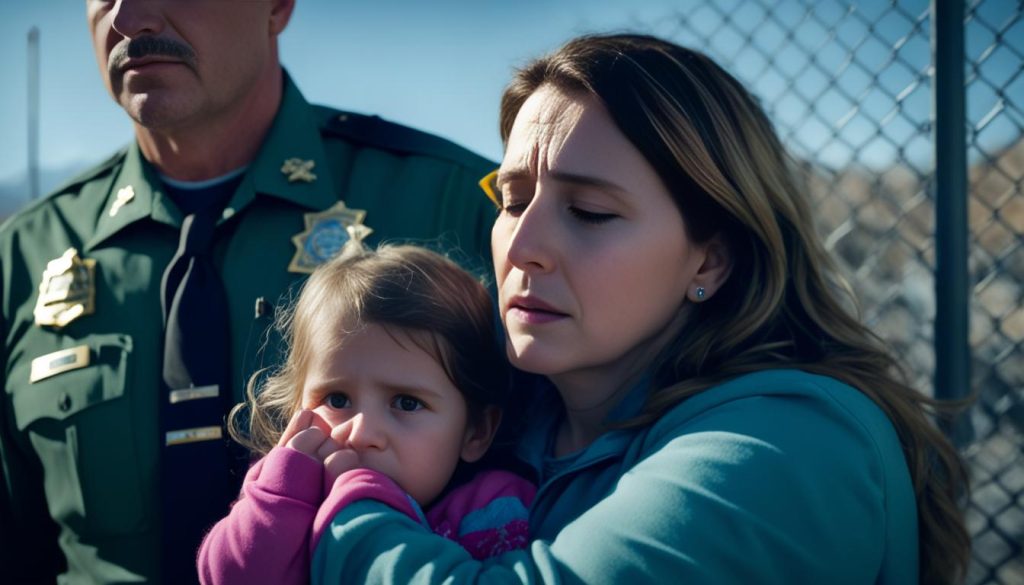In the United States, over 70 million Americans have some type of criminal record1. After they’ve served their time, people with a criminal record face big challenges. These challenges are in areas like getting a job, moving around, getting certifications, legal rights, child custody, and immigration status. The effects of a criminal record can last a long time. It’s important to know how it can affect you and get legal help if you’re facing charges.
Key Takeaways
- Criminal records can have a profound impact on various aspects of your life, even after serving your sentence.
- Understanding the potential consequences and seeking legal assistance is crucial when facing criminal charges.
- Depending on the severity of the crime, you may face potential prison sentences ranging from 6 months to 20 years2.
- Certain convictions may be eligible for sealing or expungement, but the process can be complex and requires legal expertise1.
- Victims of crimes have specific rights, including being treated with fairness and respect, and receiving information about the criminal justice process3.
Employment Challenges with a Criminal Record
People with a criminal record often face big hurdles in finding a job. Employers might be wary of hiring those with a criminal past. They worry about the person’s work history, the results of a background check, and the risk of future crimes4. This makes it hard for those with a criminal past to get a job, even if they’ve changed for the better5.
One big challenge is getting a job in the first place. Over 600,000 people are released from prison every year, but more than 75% can’t find a job a year later5. Employers often see people with a criminal history as a risk, making them less likely to hire them5. This can have a big impact, especially in low-income areas and communities of color, where criminal records can limit job options even more5.
Difficulty Obtaining Work
Finding and keeping a job is a big challenge for those with a criminal past5. More than 70 million people in the U.S. have a criminal record, showing at least one6. This makes it tough to get a job, as employers worry about the candidate’s past and the risk they might pose45.
Expungement, which clears a criminal record, can help with these job challenges. But getting it done can be hard, especially if the record is old and from when the person was young4.
| Statistic | Value |
|---|---|
| Private sector employers with 15 or more employees are covered by the anti-discrimination laws enforced by the EEOC | 4 |
| Job seekers and workers have additional legal rights under federal laws such as the Fair Credit Reporting Act and state laws | 4 |
| Federal law prohibits certain serious crimes in the last 10 years for specific jobs like security screening at airports | 4 |
| Applicants for federal employment generally cannot be asked about their criminal record until after receiving a conditional job offer | 4 |
| Claims against private or state and local government employers must be filed within 180 days of alleged discrimination, extended to 300 days if under a state or local agency | 4 |
| Federal applicants and employees need to contact an EEO counselor within 45 days of alleged discrimination | 4 |
“Private employers play a crucial role in the contemporary criminal system, with laws empowering them to discipline workers for non-workplace misconduct.”5
In conclusion, people with a criminal record face big challenges in getting a job. Employers worry about their past and the risks they might bring. But, expungement and legal protections can help ease these issues. The process might be tough for some, though. Helping these individuals find work is key to their successful return to society456.
Transportation Limitations Imposed by Criminal Records
People with criminal records often face big challenges when it comes to getting around. If they lose their driver’s license due to crimes like DUI or DWI, it’s hard to get to work, run errands, or see loved ones7. They might have to pay more to use cab services or ridesharing apps, which can be a big financial hit7.
Not being able to drive can really change someone’s life. It limits their access to important services and chances. This can make it harder for those with criminal records to keep a job, go to appointments, or join in community events7. The extra cost of getting around can also make it tough for them to focus on getting back on track in life.
It’s important to help people with criminal records overcome these transportation hurdles. This can help them get back into society and access the things they need. We need policymakers and community groups to find ways to lessen the effects of license suspensions and offer affordable, reliable transport options7.
| Transportation Options | Average Cost |
|---|---|
| Public Transportation (bus, train) | $50-$100 per month |
| Ridesharing (Uber, Lyft) | $10-$20 per ride |
| Taxi Services | $15-$30 per ride |
| Car Rental | $30-$100 per day |

The table shows how different transport options can cost a lot, especially for those who can’t drive because of their criminal record7. The cost and availability of these alternatives can really affect someone’s life. It can make it hard to keep a job, go to doctor’s appointments, or do other important things7.
In the end, the limits on transport because of criminal records can have big effects on people’s lives. It can stop them from getting the resources they need, keeping a job, and fully getting back into their communities. We need to tackle these issues to help with rehabilitation, lower the chance of going back to crime, and make sure everyone has the same chances7.
Restrictions on Obtaining Certifications and Licenses
People with criminal records often find it hard to get the certifications and licenses needed for certain jobs8. This is a big problem because many high-paying jobs are closed to those with felony convictions9.
Professions Barred for Felons
Many jobs are off-limits to felons. This includes real estate, pharmacy, pest control, insurance sales, athletic training, psychology, social work, dentistry, massage therapy, and medical roles9. Some states might make exceptions based on the crime or time since the conviction. But these rules can really limit a person’s career choices and growth.
In Arkansas, many crimes make you ineligible for certain jobs, with some exceptions for less serious crimes after five years9. On the other hand, California‘s law stops employers from asking about criminal history before offering a job, unless it’s after a conditional offer is made9.
These rules can have a big impact. They affect not just getting a job but also a person’s financial stability and life quality. Dealing with these rules is hard, showing we need to change the criminal justice system and offer more chances for rehabilitation and getting back into society.
| State | Restrictions on Certifications and Licenses |
|---|---|
| Arkansas | Long list of offenses subject to mandatory disqualification, with limited exceptions for less serious crimes within 5 years after completing sentence9. |
| California | Public employers and private employers with 5+ employees prohibited from inquiring into criminal history until after conditional offer made9. |
| Colorado | Public employers cannot conduct background check until applicant is a finalist or conditional offer is made. Certain records like non-conviction, pardoned, sealed, or expunged convictions cannot be disqualifying9. |
| Connecticut | State employers and licensing agencies must consider crime’s relationship to job/license, rehabilitation information, and time elapsed since conviction before disqualifying based on prior conviction9. |
| Delaware | Public employers cannot inquire into criminal records until conditional offer made, and then can only disqualify if crime is job-related and “consistent with business necessity.”9 |
People with criminal records face big hurdles in getting certifications and licenses for their careers9. We need big changes and a focus on helping people get back on their feet. This is key to making the job market fairer and more open to everyone8910.
Limitations on Legal Rights and Privileges
When someone is convicted of a felony, they face big limits on their legal rights and freedoms11. These limits come from the Fourteenth Amendment’s Due Process Clause. They can really affect how much someone can take part in civic life and enjoy personal freedoms.
One big limit is the right to vote. In the U.S., people with felony convictions often can’t vote, with some states taking away their vote forever11. This means those with criminal records have less say in politics.
Also, the right to bear arms is limited for people with felony convictions11. This rule, based on federal laws, takes away their freedom to hunt or defend themselves.
Another big limit is serving on a jury. People with felony convictions usually can’t be jurors11. This can make juries less diverse and fair, affecting the justice system’s fairness.
Lastly, the right to hold public office is also limited for those with felony convictions11. This stops them from playing a role in making laws that affect their communities.
Even though some states try to give more rights to people with criminal records, federal limits still affect their lives a lot11. We need to think about how these limits change people’s lives and why everyone should have equal say in society.
| Legal Right or Privilege | Limitation for Felons |
|---|---|
| Voting | Voting rights can be restricted or permanently revoked in some states |
| Right to Bear Arms | Felons are often prohibited from owning or possessing firearms |
| Jury Service | Individuals with felony convictions are frequently barred from serving on juries |
| Holding Public Office | Felons may be ineligible to run for or hold elected positions |
These legal limits have a big effect, limiting how much people can get involved and enjoy their freedoms11. It’s important to make sure all citizens, even those with criminal records, have their rights respected. This helps make society fair and just.
The Impact on Child Custody and Immigration Status
A criminal record can greatly affect an individual’s life, especially in child custody and immigration matters12. In child custody cases, a criminal record might make courts doubt an individual’s ability to keep their child safe and stable12. This could lead to changes in custody or visitation rights12. For those trying to become legal residents or citizens, a criminal record can make the process harder or even lead to deportation12.
Child Custody Oversight
Courts often consider a criminal record when making child custody decisions, seeing it as a risk to the child’s safety12. In 2018, 4.4 million U.S.-citizen kids lived with at least one undocumented parent12. Also, 6.1 million U.S.-citizen kids lived with an undocumented family member12. The deportation of a parent from 2011 to 2013 affected about half-a-million U.S.-citizen children12. This can disrupt a child’s life, impacting their financial stability, sense of safety, and overall well-being.
Immigration Consequences
Having a criminal record makes the immigration process tough12. By 2017, there were 273,000 U.S.-citizen children of TPS holders from El Salvador, Honduras, and Haiti12. A 2020 study found that detentions or deportations of family members linked to higher rates of suicidal thoughts, alcohol use, and aggression in Latino teens12. ICE raids can also cause school absences, with over 500 students missing a day after a raid in eastern Tennessee12. Families dealing with immigration issues might see a big drop in income after enforcement, losing about 45% of their income on average, according to 2018 Census data12.
A criminal record can deeply affect an individual’s life, including child custody and immigration121314. It’s important for individuals with a criminal record to understand these impacts. This knowledge can help them make better decisions and seek legal support to protect their rights and their family’s well-being.

Conclusion
A criminal record can have big effects that last a long time, going beyond just legal trouble15. People with a criminal past may struggle to find a job, get a driver’s license, or get certain professional licenses16. They might also face limits on their rights and freedoms16. This can also affect things like child custody and immigration status, making things even harder16.
How much a criminal record affects someone depends on the state and the crime itself. It’s important for those facing charges to take it seriously and get help from a skilled criminal defense lawyer17. Knowing the long-term effects and fighting for your rights can help you get through the legal system with less damage17.
Choosing to work with a criminal defense lawyer can really help lessen the bad effects of a criminal record and help you move on with your life151617.
FAQ
What are the potential consequences of having a criminal record in the United States?
Having a criminal record can make life tough in many ways. It affects jobs, travel, getting licenses, legal rights, child custody, and immigration status. The effects can be deep and long-lasting.
How does a criminal record affect employment opportunities?
Employers might be wary of hiring people with criminal pasts. They worry about work history, background checks, and the chance of future crimes. This makes it hard for those with records to find work, even if they’ve changed.
How can a criminal record impact transportation options?
Some crimes, like DUI or DWI, can take away your driver’s license. This makes getting to work, running errands, or visiting loved ones hard. People might have to spend more on cabs or ride-sharing apps.
What types of professions are often barred for individuals with a felony record?
Felons often can’t work in fields like real estate, pharmacy, or dentistry. Some states might make exceptions, but these rules can limit career choices and growth.
How can a criminal record affect an individual’s legal rights and privileges?
Having a felony record can limit your legal rights. You might lose the right to vote, bear arms, or serve on a jury. These limits can affect how you take part in civic life and your personal freedoms.
How can a criminal record impact child custody and immigration status?
A criminal record can make people question your ability to care for your child. This could affect custody or visitation rights. For those trying to become legal residents or citizens, a record can make things harder or even lead to deportation.
Source Links
- Sealing your criminal record
- Criminal Practice Division | NJ Courts
- Victims and Witnesses: Understanding Your Rights and the Federal Court System
- Arrest and Conviction Records: Resources for Job Seekers, Workers and Employers
- Criminal Employment Law
- Conviction, Imprisonment, and Lost Earnings: How Involvement with the Criminal Justice System Deepens Inequality
- Criminal Justice Process
- T:\TS\PAMP2016\AFTERP~1\CRIMINAL\CRIM2016.XY
- 50-State Comparison: Limits on Use of Criminal Record in Employment, Licensing & Housing
- NYS Open Legislation | NYSenate.gov
- due process
- U.S. Citizen Children Impacted by Immigration Enforcement
- Decriminalize Immigration
- Immigrants and Families Appear in Court
- Steps in a Criminal Case, Emmet County Michigan
- How a Case Moves Through the Court System
- Stages of a Criminal Trial

